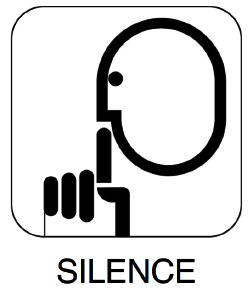 We all talk too much. I’m not referring to intelligent conversation, rational argument, intellectual debate, or anything of that ilk. I’m thinking about all of the idle chit-chat, meaningless prattle and idle bulls**t that pollutes our auditory system on an almost never-ending basis. We have Talk Shows on TV. When we get in the car and turn on the radio, Talk Radio of every imaginable variety blasts out of the speakers. Where do we turn for some peace and quiet?
We all talk too much. I’m not referring to intelligent conversation, rational argument, intellectual debate, or anything of that ilk. I’m thinking about all of the idle chit-chat, meaningless prattle and idle bulls**t that pollutes our auditory system on an almost never-ending basis. We have Talk Shows on TV. When we get in the car and turn on the radio, Talk Radio of every imaginable variety blasts out of the speakers. Where do we turn for some peace and quiet?
I don’t want to get sidetracked into a rant about politically-oriented talk radio, but I do find it interesting that in the USA, the popularity of talk radio exploded during the 1990s due to the repeal in 1987 of the Federal Communications Commission’s post war Fairness Doctrine of 1949. The agenda of the Fairness Doctrine was to ensure that audiences were exposed to a diversity of viewpoints. While it never required that equal time be given to opposing views, it had required the holders of broadcast licenses to “present controversial issues of public importance” and to do so in a manner that was, in the Commission’s view, “honest, equitable and balanced”. Repeal provided an opportunity for the kind of partisan political programming that had not previously existed, and offered a commercially viable platform for the Rush Limbaughs, Glen Becks and Al Frankens of the world to fill the airwaves with their singularly partisan viewpoints.
I’m reminded of a quote from Albert Einstein:
“If A is success in life, then A equals X plus Y plus Z. Work is X, Y is Play, and Z is keeping your mouth shut.”
Why don’t we follow Einstein’s advice? He was, after all, one of the great geniuses of history. What is it that seemingly compels us to fill the air with the sound of our own voice.
Perhaps it is because, in Western cultures, people find that is is difficult to interpret the message being sent by a person being silent (i.e. not speaking). It can mean anger, hostility, disinterest, or any number of other emotions. Because of this, people in Western cultures may feel uneasy when one party is silent and will frequently try their best to fill up the silence with small talk. Of course, small talk has value in many circumstances. It serves as a social lubricant. It helps fill the uncomfortable silence gaps, and can be used to ease into and out of important conversation. But when ALL talk is SMALL talk, something is definitely out of kilter.
 Perhaps all of this talking is the result of decades of parents teaching their children to “speak their mind,” in contrast to the “children should be seen and not heard” mentality that pervaded the child-rearing practices of my generation’s parents. The idea of speaking your mind freely seems to make sense, especially when you are trying to encourage children to feel good about themselves and who they are. But it doesn’t work when they habitually press the gas pedal to the mouth without engaging the clutch to the thinking centers of the brain.
Perhaps all of this talking is the result of decades of parents teaching their children to “speak their mind,” in contrast to the “children should be seen and not heard” mentality that pervaded the child-rearing practices of my generation’s parents. The idea of speaking your mind freely seems to make sense, especially when you are trying to encourage children to feel good about themselves and who they are. But it doesn’t work when they habitually press the gas pedal to the mouth without engaging the clutch to the thinking centers of the brain.
Could it be that we have we forgotten the value of contemplative thought? Do we no longer feel the necessity for consideration and reflection as a path to insight and learning?
 While most of us aren’t cut out to be hermits, we might learn something from the Carthusian Monks. The Carthusians embrace silence as an important part of their way of life. The Carthusians lay great importance on silence yet, contrary to popular belief, do not require a vow of silence. Silence is such an integral part of their lifestyle that no such vow is necessary. A Carthusian monk spends a great deal of his time alone in his hermitage, where there is no occasion to speak. Much of the rest of his time will be spent in church, where personal conversation is also not called for. And apart from two important recreational periods every week, specially set aside for the monks to talk to each other, he will avoid all but the most necessary speech.
While most of us aren’t cut out to be hermits, we might learn something from the Carthusian Monks. The Carthusians embrace silence as an important part of their way of life. The Carthusians lay great importance on silence yet, contrary to popular belief, do not require a vow of silence. Silence is such an integral part of their lifestyle that no such vow is necessary. A Carthusian monk spends a great deal of his time alone in his hermitage, where there is no occasion to speak. Much of the rest of his time will be spent in church, where personal conversation is also not called for. And apart from two important recreational periods every week, specially set aside for the monks to talk to each other, he will avoid all but the most necessary speech.
Whether their silence is a gift or a penance no doubt depends on the individual, and at different times it could be either or both. But it was obviously considered a rare and precious commodity even in the 11th Century when the Carthusian Orders was founded and now 1,000 years later its special value for some people has hardly diminished. Silence lies at the centre of Carthusian spirituality.
There is a real power in silence. One of the best pieces on the power of silence I have read recently, titled “Silence,” was authored by Daniel Tenner and posted on his blog swombat.com. Tenner gives some powerful personal examples showing how habitually listening and reflecting before speaking caused people to really pay attention to what he wanted to say.
 The next time we feel that we have something important to say, something that can’t possibly wait for a better time, something that the universe demands be spoken right now, we should consider the words of Will Durant, the noted historian/philosopher and author of the 11-volume masterwork, “The Story of Civilization,” who advised that:
The next time we feel that we have something important to say, something that can’t possibly wait for a better time, something that the universe demands be spoken right now, we should consider the words of Will Durant, the noted historian/philosopher and author of the 11-volume masterwork, “The Story of Civilization,” who advised that:
“One of the lessons of history is that nothing is often a good thing to do and always a good thing to say.”
Perhaps it is because the other four letter word meaning intercourse is not available
From you, the comment is not in the least surprising.